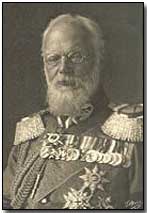Feature Articles - Munich
Gathering Storm
Having noted the breakdown at a national level, now is a good time to turn attention back onto Munich.
Before Baden's resignation events in Munich only seemed to confirm that the disintegration of Wilhelm's Empire was permanent and irreversible. Frightened by the increasing militancy of the revolutionaries the Bavarian State government decided to release the detained radicals in the somewhat bizarre hope that this action would dissipate much of the growing pressure.
Kurt Eisner was freed from detention on 14 October to contest one of Munich's Reichstag seats made vacant by the former incumbent's retirement.
The man expected to take over the seat was the Bavarian SPD leader, Arhard Auer. Amazingly, Auer held an incredibly blasé attitude towards the very real threat posed by Eisner, who was now busy on the campaign trial.
Auer was a sturdy Bavarian type and a man from peasant stock. Eisner was, of course, a Berlin Jew. Auer shrugged off his SPD colleague's fears that his unorthodox opponent was winning the vote: "Eisner is out of the picture," he said.
Keen to prove that the groundswell of popular opinion was with him, Auer called for an organised rally and protest march to be held on 7 November in Theresienwiese, the large field where Munich's famous Oktoberfest is held annually.
The SPD and USPD teamed up and called on their supporters to attend. Although both parties made uneasy bedfellows, both saw how events were turning at a national level and both believed that the time was now right to tackle the 'Old Regime' head on in Bavaria by using the election to a Reichstag seat as a conduit to voice their dissatisfaction.
An Unlikely Revolution
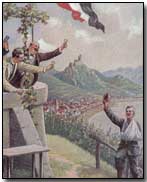 An enormous crowd gathered - around 80,000 - and the event began in an almost
festive spirit as brass bands played and the workers made the most of a day off
from the drudgery of wartime life. Disregarding the order to stay confined to
barracks, there were even a number of troops present.
An enormous crowd gathered - around 80,000 - and the event began in an almost
festive spirit as brass bands played and the workers made the most of a day off
from the drudgery of wartime life. Disregarding the order to stay confined to
barracks, there were even a number of troops present.
Auer's speech was well received, but most attention was soon centred on Eisner, who launched into an electrifying harangue. Today the revolution had arrived, he told the crowds: "Scatter throughout the city," he called, "occupy the barracks, seize weapons and ammunition, win over the rest of the troops, and make yourselves masters of the government!"
As Eisner stood down, one of his subordinates leapt to his feet and shouted: "Comrades, our leader Kurt Eisner has spoken. There is no reason to waste any more words. Follow us!"
The crowds duly obliged. They formed up and followed Eisner and his aides, while Auer's smaller band of supporters marched off to the east and peacefully dispersed.
With Eisner at their head, a vast column of protestors walked to the Guldein School, which had been converted into a temporary munitions depot. The officers in charge of the building were powerless to stop the crowds from helping themselves to rifles and rounds.
Eisner now took the masses north to the large Maximilian Kaserne barracks and the military quarters attached to it. Within hours, Munich's other main military buildings had been taken over by the protesters. While this was happening, Eisner set up his 'headquarters' at the Mathäserbräu, one of Munich's largest and most popular beerhalls.
With the alcohol flowing freely, left-wing soldiers set up - following the Bolshevik's example - a Council of Soldiers and Sailors, while Eisner created a Council of Workers. A short time later Eisner combined the two 'organisations' into the more Marxist sounding Council of Workers, Soldiers and Peasants. In turn, they gave Eisner power to set up a 'Bavarian Republic' and to seize the apparatus of the state.
Soldiers were promptly sent out to take control of Munich's important government buildings and key parts of the city's infrastructure. At 10pm, Eisner and the council members marched with an armed guard into the Landtag. Here Eisner declared the founding of the Bavarian Republic.
"The Bavarian revolution is victorious," he said, adding, "it has put an end to the old plunder of the Wittelsbach kings."
Eisner announced his expectation to be made Bavaria's new Prime Minister and gave a rather brief outline of his short-term plans for government.
Farewell To The Wittelsbachs
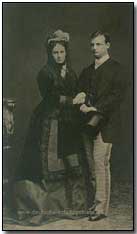 Earlier that day, Ludwig III first became aware that something was wrong when he
noted the palace guards had not turned up for work.
Earlier that day, Ludwig III first became aware that something was wrong when he
noted the palace guards had not turned up for work.
Out taking a constitutional walk in nearby gardens, aides caught up with him and informed their monarch that the state government was on the brink of collapse. He was told to head back to his palace, but not via the main entrance as a crowd of protestors was starting to gather there.
Rather than preparing for a flight, Ludwig locked himself in his apartments. At 8pm two of his ministers arrived and were admitted to an audience with the king. Their news was grim - protection of Ludwig and his family could not be guaranteed, as there were no troops in the city still loyal to the Old Regime. It was vital for the Wittelsbach's safety for them to flee Munich immediately.
The fall of a 750-year-old dynasty was tinged with farce. Ludwig informed his family and loyal retainers to prepare to flee by car - they would go to a Wittelsbach estate near the Austrian border. However, there was one rather embarrassing snag: the royal chauffeur had left to join the revolutionaries. Ludwig took the only step available - he called on a car rental agency.
At 9.30pm the family and servants clambered into three vehicles. Outside of Munich they ran into heavy fog and the king's car skidded off the road and into a muddy potato field, where it became stuck. Members of the party then trudged off into the countryside to look for help.
They met two soldiers, who had stabled their horses and were spending the night at farmhouse before moving on. Helping their deposed king, they joined in with the gruelling task of hauling the car out of the quagmire. At 4.30am Ludwig's party got under way again.
Arriving at his estate, Ludwig was promptly informed that the kingdom was now a republic and that he was now a wanted man. Revolutionary soldiers were already out hunting for him. Well aware of what had happened to the Russian Tsar, Ludwig crossed the border into Austria. He ended up living in Hungary a disillusioned and broken man. In 1921 the last Wittelsbach king died.
New Order
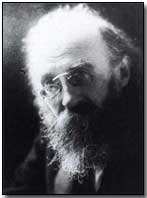 On 8 November, as revolution and unrest swept the nation, and the German
delegates drove across the front lines to agree terms, a single newspaper in
Munich (the rest had been halted from publishing that day) proclaimed Kurt
Eisner's new regime. The announcement declared that a new era of
enlightenment and humanity had arrived in Bavaria.
On 8 November, as revolution and unrest swept the nation, and the German
delegates drove across the front lines to agree terms, a single newspaper in
Munich (the rest had been halted from publishing that day) proclaimed Kurt
Eisner's new regime. The announcement declared that a new era of
enlightenment and humanity had arrived in Bavaria.
In the spirit of this new age Eisner formed an emergency cabinet composed of three SPD appointments (including Auer, who saw no other choice but to join the new regime - power could be secured once elections had been held), and three USPD and one non-aligned radical members.
Eisner was officially made the Prime Minister of the Bavarian republic. To quell middle and upper class fears, he declared that all private property would remain untouched by the state until further notice.
As revolutions go, Eisner's had been relatively peaceful and, while not creating a sense of overwhelming optimism - news from the front and the rest of the country caused too much concern for this - it did give Bavarians the general feeling that life would, perhaps, somehow improve.
Eisner immediately set out to maintain Munich's law and order, although he was somewhat reckless in his methods. Essentially, he asked workers from factories and the drinkers from beerhalls to form security patrols. Various factions formed and began to battle for control of the streets.
When not fighting among themselves they 'policed' their districts with arbitrary justice - in some cases beating up innocent passers-by because they did not like the look of them.
Eisner went on to task his minister for military affairs, Albert Rosshaupter, to sort the mess out. Unfortunately, Rosshaupter had enough on his plate keeping the soldiers returning from the front fed, housed and placated, and so the problem merely rumbled on.
Eisner's Folly
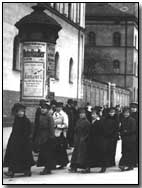 For Eisner it was essential to secure quick Allied assistance in sending badly
needed food and supplies. To obtain this aid, Eisner believed that Bavaria
needed to distance itself from the old Prussian regime.
For Eisner it was essential to secure quick Allied assistance in sending badly
needed food and supplies. To obtain this aid, Eisner believed that Bavaria
needed to distance itself from the old Prussian regime.
He was well aware that that the Allies were looking for 'ammunition' to level the blame of war against the Germans. Thinking he would be rewarded for supplying the necessary details, on 25 November, at a conference of German States he dropped a political bombshell.
He released the reports from the Munich legation in Berlin from the days leading up to the outbreak of war. The papers recorded the Kaiser government's enthusiastic support for Austro-Hungary's bellicose stance on Serbia.
While the Allies were more than happy to receive information that helped them in drawing up the famous 'shame paragraphs' blaming Germany for the war, they were not willing to play Eisner's game: Bavaria would receive no special treatment.
Eisner went back to Munich probably well aware that the rest of Germany now loathed him. What mattered most to him, however, was not the opinion of the rest of Germany, but the people of Bavaria.
Eisner believed Bavarians would praise his efforts to elevate their suffering by any means available. He was therefore somewhat shocked at his frosty reception on returning to Munich. Most Bavarians, even those who had cursed Prussia and the Kaiser, felt disturbed that their state was the one willing to sell the rest of Germany down the river.
The SPD (apart from the shame they felt) were also livid. Eisner had failed to consult them on his actions and had left them to make red-faced apologies to the party leadership in Berlin. For the soldiers of the Bavarian Army - now returning from the front, or like Adolf Hitler, convalescing in hospital - Eisner's actions incensed them too.
For those on the right it was proof that Eisner the Jew was a Bolshevik in disguise, while for those on the left it was proof that the Bavarian Prime Minister was a half-hearted 'revolutionary', dancing to the tune of the capitalist nations.
'Rex' Eisner
Eisner shrugged off his initial blunders, took the incredible step of 'cutting' diplomatic links to Berlin and then carried on by running Munich and Bavaria in his own unique style.
From the very start of his rule, Eisner's offices were open to the public. Visitors could come and go as they pleased and most took careful note of their messy appearance. Strange at it may seem, Eisner was willing to let people examine any papers on his desk, while piles of other important documents were simply dumped on chairs, or any other available place.
The French journalist Paul Gentizon was there to witness the eccentric Eisner in action. He wrote: "Diplomatic papers, parchments, revolutionary proclamations and telegrams cover tables and armchairs in a confusion suggesting the backroom of a shop… No method and no organisation seems to prevail in the working of this strange ministry."
The increasing disorganisation on Eisner's desk was reflected by the increasing disorganisation in Munich life. Eisner knew a great deal about theatre - he knew very little about economics. Despite this, and to his credit, he did manage to make a number of sensible decisions.
He began his government by prudently holding off from nationalising Munich's industry, which many of his supporters wanted done immediately. "There can be no socialisation," he said, "when there is scarcely anything to be socialised."
Having taken this useful step, Eisner then knuckled down to debating social and economic issues with his 'coffee house' friends - men who included a number of eccentrics that made the Prime Minister of Bavaria seem positively plebeian.
With their advice he issued a series of high-minded proclamations and glorified statements of intent, although within the morass of purple prose were a number of laudable measures: compulsory military service was abolished; working hours were reduced; and women's education was to be reformed. For those on the far left, however, Eisner's reluctance to impose immediate nationalisation and socialisation measures smacked of betrayal.
Next - On The Ropes
Russia mobilised 12 million men during the war; France 8.4 million; Britain 8.9 million; Germany 11 million; Austria-Hungary 7.8 million; Italy 5.6 million; and the USA 4.3 million.
- Did you know?

